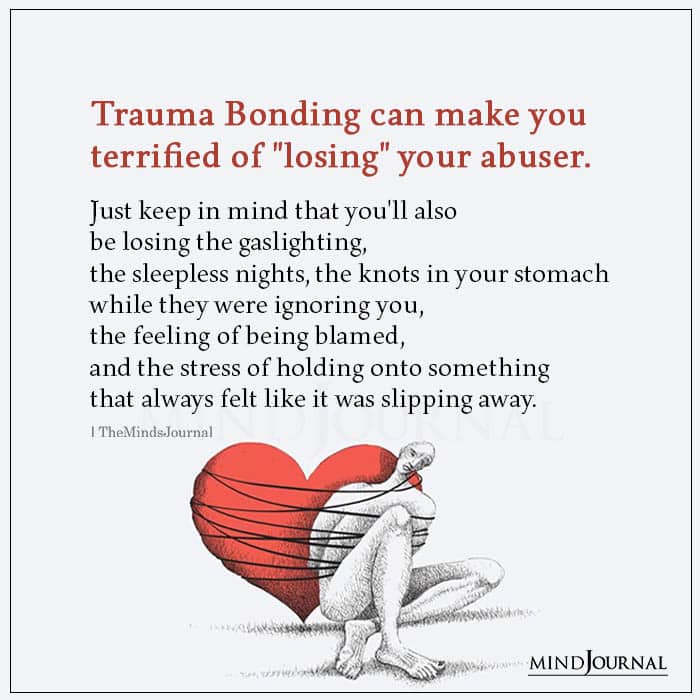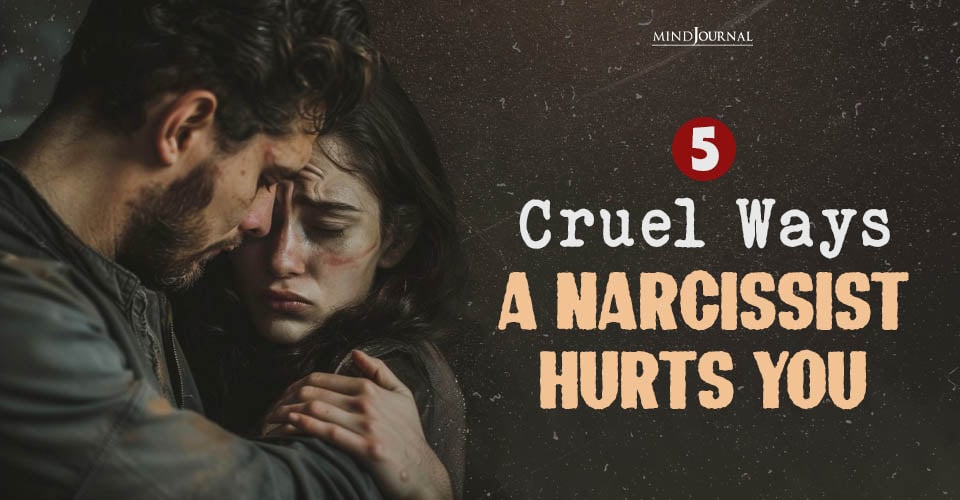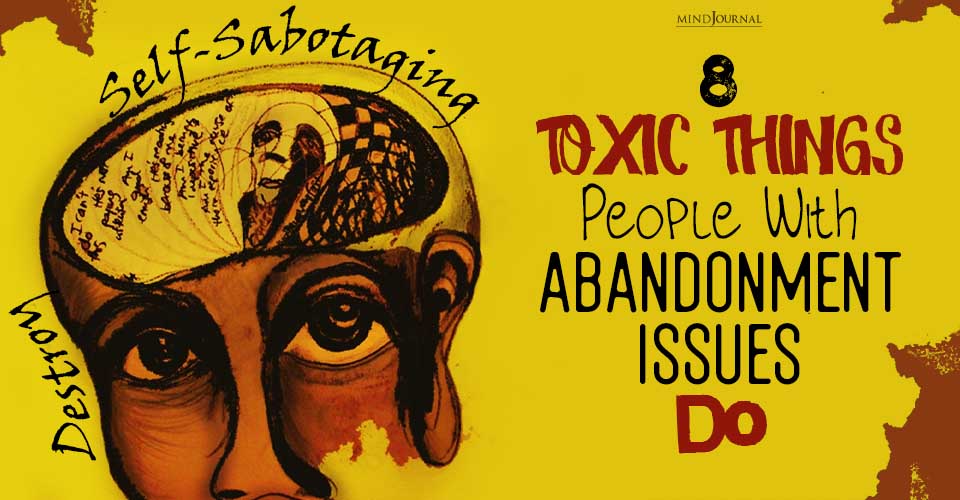Relationships are an integral part of human life. We all want to love and be loved. But, in your opinion, what is the most important aspect of it? Love? Or a healthy relationship, perhaps?
A healthy relationship is one in which you openly discuss each other’s feelings. When we form a stable relationship with our significant other, it provides us with both physical and emotional well-being. But, surely, not everyone has had the same experience? Some people form trauma bonds instead of love bonds.
Trauma bonds are toxic relationships that grow stronger over time when couples fail to recognize red flags and hope that their relationship will fix itself with time.
Trauma bonds form in severe cases, such as exploitative or codependent relationships, where one person is emotionally burned out while the other is blissfully unaware of it.
If you were someone who dealt with such toxic relationships, or you have witnessed this type of connection, then here are 10 signs of a trauma bond relationship and to overcome it:
Here Are 10 Signs To Identify That It Wasn’t Love, But A Trauma Bond Relationship.
1. You’re Way Too Dependent On Them.
There is a term used to describe people who are overly dependent on their partners, it is known as Codependency. It is a relationship where your happiness and identity are dependent on your significant other.
The issue arises when one person takes advantage of the other. It could be both emotionally and physically draining, as well as financially. It’s almost as if you’re trying to manipulate the other person. Sometimes it’s unintentional whereas most of the time it happens knowingly.
This encourages toxic behavior in relationships, where you constantly give them second chances and they keep on making the same mistakes.
Related: Codependency in Toxic Relationships: Symptoms, Signs and How To Recover
2. You Try To Change Yourself For Them.
A healthy relationship is one where you accept them the way they are. If you have come across a relationship that made you change things about yourself, then it was not “love”, it was definitely a trauma bond and you certainly don’t need anyone in your life who doesn’t love you for who you are.
You can always try to change yourself for the better but never for someone else. If they really cared about you you wouldn’t be changing your habits or individuality for them.
Related: 5 Ways Letting Go Of A Toxic Relationship Will Change Your Life
3. You Feel Addicted To Them.
When we think of addiction, substances such as drugs, alcohol come to our minds. However, have you ever wondered if ‘love’ could be an addiction? It’s true, if you feel like you’re becoming addicted to the other person, you’re experiencing the early stages of a trauma bond.
You stick to them even after you’ve had fights that have turned into emotional breakdowns. You continue to be with them because you believe you are nothing without them and there’s no way you can let them go.
Remember to distinguish between love and anything that emotionally breaks you.
Related: 6 Toxic Relationship Habits Most People Think Are Normal
4. You Question Yourself If This Is How Love Should Feel Like.
“Love should not make you feel like walking on eggshells.” — Emma Xu
When you fall in love with someone, it should make you feel complete. You should feel happy about being with them. Of course, there are some days when you have petty fights and misunderstandings but that’s normal. The problem occurs when you have constant disagreements and feel invalidated. Is it true love then?
If you have to ask yourself if this is how love should feel then, perhaps, something’s just not right. Don’t try too hard to fight a battle that is already lost. You need to let go of a relationship that is not good for you, both mentally and emotionally.
Related: 6 Early Red Flags Of A Toxic Relationship
5. They Ignore Your Needs.
When the one you love ignores your needs, it is the worst feeling ever. You feel unwanted when you have always been there for them… through thick and thin.
It is no less than a trauma bond, when it is their chance to be there for you, they remain unbothered and oblivious. If you demand attention they act unaware. You’re not too needy, if they had paid attention to you, things would have been different.
Related: 4 Ways You Can Heal Trauma Bond After a Narcissistic Relationship
6. You Sacrifice Your Needs To Make Them Happy.
Have you tried winning your partner’s attention by buying them gifts that were over your budget? Or always kept their needs before yours?
Well, you’ve experienced a sign of a trauma bond where you try to win their affection all the time. Relationships should be equal. Both partners have to give the same amount of time and effort. If you were the only one making efforts then it lacked understanding and most importantly, respect.
You need to stop bending over backward all the time to make them happy. The right person will appreciate you and will not allow you to sacrifice your own needs.
Related How to Cut an Unhealthy Bond with Someone
7. You Feel Like You’ve Had More Breakups And Patch-Ups Than Happy Moments Together.
Having serious fights sometimes in a long-term relationship is common, we all go through ups and downs. However, if it becomes a pattern then it is a matter of concern.
You need to ask yourself if you deserve to be unhappy. Your relationship shouldn’t have more rough patches than happy moments. It doesn’t mean that you can’t handle tough situations but it simply means you are putting your mental health before anything else.
8. You Or Your Partner Experience Extreme Jealousy.
It’s normal to experience jealousy from time to time. But it surely becomes an issue when they are constantly jealous about certain aspects of your life. They keep checking who you follow on Instagram and stalk all your friends.
The problem becomes an issue when you both fail to acknowledge it. There is a difference between healthy jealousy and constantly doubting each other.
Related: 5 Reasons You Might Be Holding On To A Toxic Relationship
9. They Make Big Decisions Without Consulting You.
Individuality in a relationship is essential. As an adult, you don’t need to seek anyone’s permission before making your own decisions. While dating, it is healthy for couples to discuss their plans and future ideals.
It becomes a trauma bond for you when they make important decisions without consulting or even telling you. For instance, withdrawing a lump sum amount of money from a joint bank account without even telling you.
Related: 11 Signs It’s An Emotionally Abusive Relationship
10. They Exhibit Controlling Behaviors.
We all try to control things in our lives, perhaps even our partners’, for the better. However, when you are forced to change certain aspects of your life, it can be unhealthy.
Being aggressively controlled in relationships is also abuse and it may not be physical. but many times you may experience emotional abuse in the form of gaslighting or insults.
Related: The 10 Types of Toxic Relationships You Should Avoid At All Costs

How To Overcome Trauma Bonds?
When you overcome trauma bonds and you see that what you were really holding on to, was not worth the trouble. You learn that love is supposed to feel wonderful and not like walking over eggshells.
All relationships teach us something, and some are positive while others are not. But, we still learn from those experiences so that we don’t make the same mistakes again in the future.
If you’re finding it difficult to let go, here’s how you can overcome trauma bonds that have hurt you the most:
- Identify the red flags in a relationship, before it’s too late.
- Eliminate those who disrespect or put you down.
- Focus on your needs and emotional well-being.
- Stand up for yourself, even if it means going against them.
- Seek professional help and go for therapy if required.
Related: Trauma Bonding: Why We Stay In Abusive Relationships












Leave a Reply